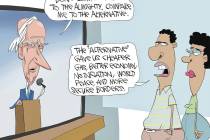Welfare state
Once the numbers were crunched from the first quarter of this year, it turned out a major goal of the Obama-Reid-Pelosi economic plan has been achieved. This winter, paychecks from private businesses shrank to their smallest share of personal income in U.S. history, a USA TODAY analysis of government data reveals. At the same time, government-provided benefits -- from Social Security, unemployment insurance, food stamps and other programs -- rose to a record high.
A record-low 41.9 percent of the nation's personal income came from private wages and salaries in the first quarter, down from 44.6 percent in December 2007.
Meantime, 17.9 percent of Americans' overall personal income came from government programs in the first quarter, up from 14.2 percent when the recession started. And an additional 9.8 percent of personal income was paid as wages to government employees.
This is "a major shift in the source of personal income from private wages to government programs," the paper notes.
Picture a graph with two lines gradually converging. Over the full decade since 2000, the share of the nation's wealth paid out as private wages has dropped almost six points, from 47.6 to that current 41.9 percent. Over the same decade, the portion of the nation's wealth paid out as "government-provided benefits" has grown by nearly a third, from 12.1 percent to 17.9 percent.
In other words, though the numbers aren't precise (some benefits are taxable, allowing some "leakage" between categories), a decade ago private-sector workers had to part with only about a quarter of their income, in the form of taxes, to support these federal enterprises. But it's now reached the point where private-sector workers must hand over something more on the order of 40 percent of their earnings to cover all the vote-buying handouts -- before government salaries and overhead are thrown in!
The trend is not sustainable. "The federal government depends on private wages to generate income taxes to pay for its ever-more-expensive programs," says University of Michigan economist Donald Grimes. "This is important."
Nor is it easy to cut back. Economist Veronique de Rugy of the free-market Mercatus Center at George Mason University says the riots in Greece over cutting benefits to close a huge budget deficit are a warning about how hard it is to escape the tarbaby of such unsustainable programs.
The recession has erased 8 million private jobs. And the "bailouts" have accelerated the problem, by shifting taxpayer money primarily to prop up government bureaucracies.
But the progressive folks now in charge in Washington aren't apologizing. In fact, it's clear this is precisely the direction -- toward universal government dependence -- in which they want those converging lines to head.























